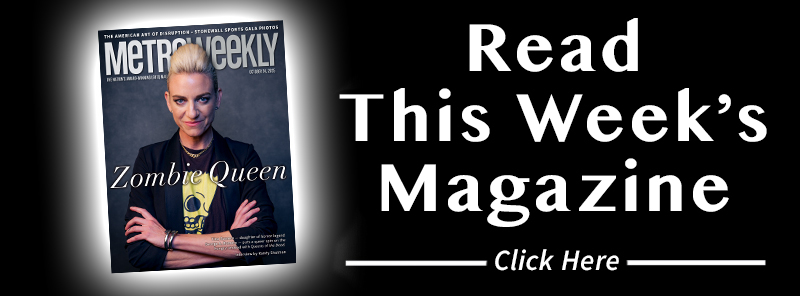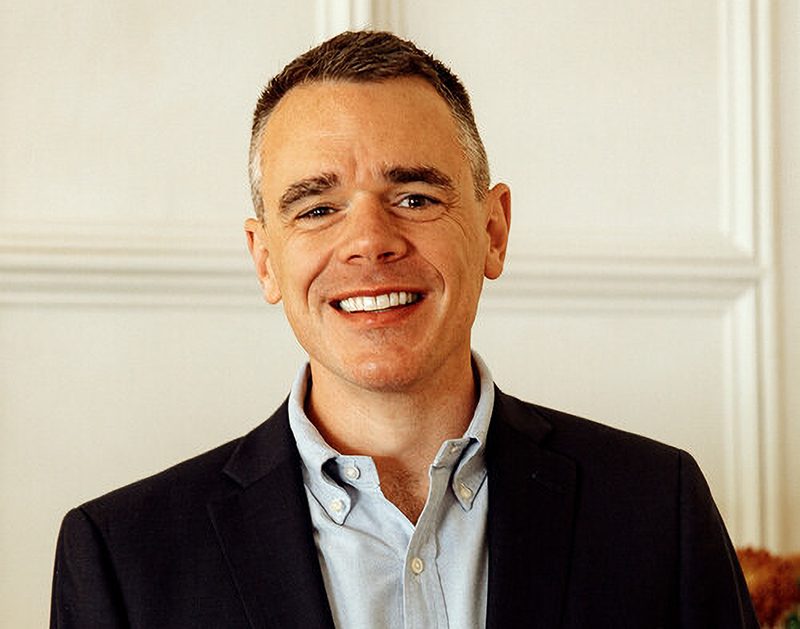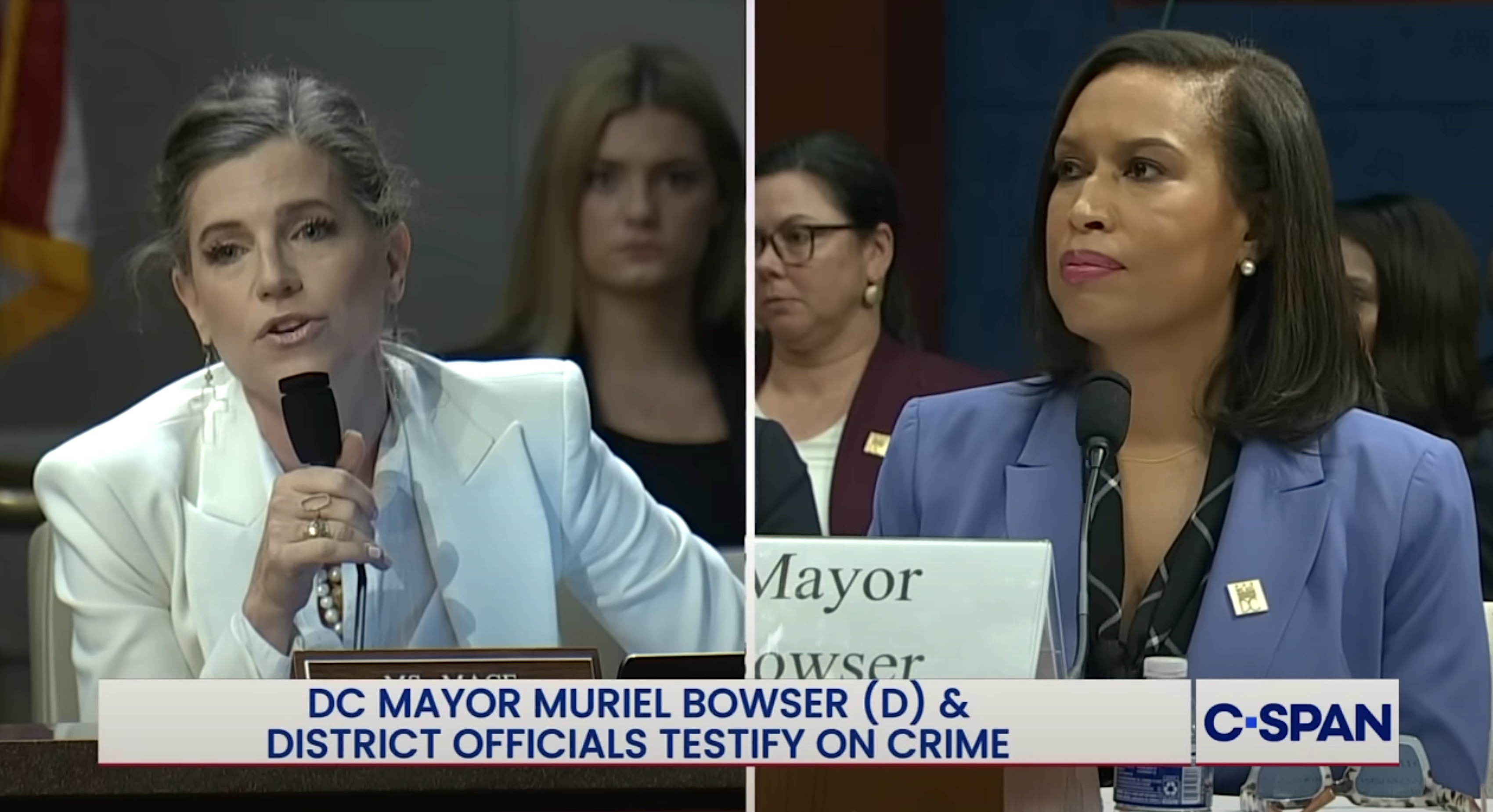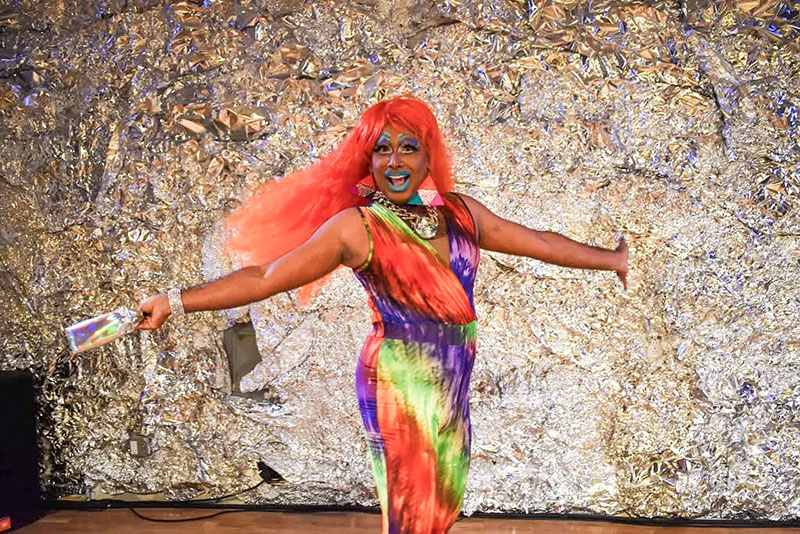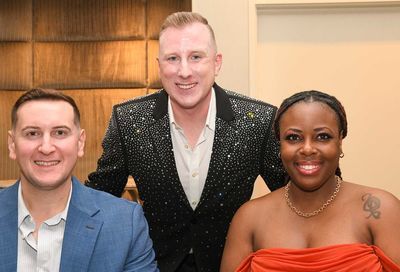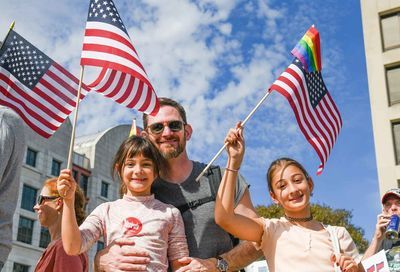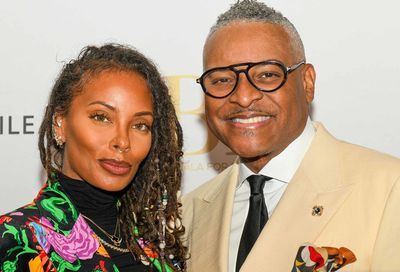Right Here, Right Now
Interview with Log Cabin Republican Executive Director Patrick Guerriero
Photography by Todd Franson
Casually dressed and sitting in his apartment building’s lobby, Patrick Guerriero looks like a man intent on taking half a day off for some relaxation. The days following the U.S. Supreme Court’s decision overturning sodomy laws have been days joyous but hectic, and a few hours of down time would be welcome.
Then Senate Majority Leader Bill Frist announced to the Sunday morning talk show world that he thought a constitutional amendment barring gay marriage would be a fine idea, and any chance for relaxation was off. But you get the impression that Guerriero doesn’t mind jumping right back into the fray.
It’s an interesting time to be a leader of a national gay organization. Not even a year into his job as executive director of Log Cabin Republicans, and Guerriero, 34, is charting a course through a political terrain that’s changing faster than anyone expected. While the sodomy victory is still being savored, the highest court in his home state is expected within days to release an opinion possibly opening civil marriage to same-sex couples. It’s only going to get busier from here.
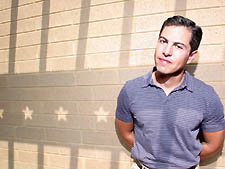 |
Born to a family of Italian and Armenian immigrants in Melrose, Massachusetts, Guerriero calls his upbringing in the Boston suburb “fairly conservative, middle class America.” But his own family’s history helped them to accept his homosexuality, despite their somewhat conservative Catholicism.
“My family’s experience with discrimination, from the perspective of my father being an Italian immigrant,” he says, “allowed for a childhood where a discussion of inclusion and the danger of discrimination was a part of my upbringing.”
Guerriero came out in 1991 during his early twenties, and two years later won election to the Massachusetts state legislature. After three terms there, he was twice elected mayor of his hometown, certifying his rising political star. Then, in 2002, Republican Gov. Jane Swift, the first woman to serve in that office, tapped Guerriero as the nation’s first openly gay candidate for Lt. Governor.
Swift, who had faced a number of high-profile controversies during her administration, later pulled out of the gubernatorial race. Guerriero says that despite the disappointment of ending the candidacy, the overall experience was positive.
“If one fifteen-year-old girl who was struggling with her sexual orientation turned the TV on and saw an openly gay or lesbian person standing next to the governor, and I helped her come to a sense of self-dignity, then the whole race would have been worth it.”
Having made the transition from an elected official to a full-time advocate, Guerriero says his focus is on finding “fair-minded Republicans” to make the party currently dominating the Washington political scene more open and accepting of gays and lesbians. As always, that mission remains controversial in a community that is still heavily Democratic, but Guerriero is convinced that it’s a mission that will succeed.
And as the gay community and the radical right gear up for what is likely to be the biggest battle ever over gay civil rights, Guerriero believes it’s a mission that’s more important than ever.
METRO WEEKLY: How have you found the transition from elected office to a lobbying and issue-advocacy position?
PATRICK GUERRIERO: It’s a challenging transition, but there’s something much more rewarding about campaigning for fairness and equality for gay and lesbian Americans versus campaigning for myself. I have never felt more energized or passionate about my work than I have in the last eight months. I spent most of my public service fixing streets, fighting for more public education dollars, doing all the nuts and bolts governing on the state and local level. This transition has allowed me to give back to the gay and lesbian community, who supported me over the course of those challenges. To spend almost every minute of every day focusing on these issues is both personally rewarding and something I feel I have a sense of obligation to do. I consider myself one of the most fortunate gay and lesbian Americans ever involved in public service, having been in a legislature, been a mayor, run for Lieutenant Governor, and now heading a national organization. When you’re that fortunate you have an obligation to step up to the plate.
MW: You’ve been traveling a lot lately around the country. What’s been the focus of that?
Guerriero: The year-long national tour that I’m on has been to meet our Log Cabin members and chapters across the country face to face, to talk to them and listen to them. It’s also to meet with fellow gay and lesbian activists across the country, to hear how we can work together on issues. And a project of my own has been to reach out to HIV/AIDS service providers to get a better sense of how Log Cabin can help communicate their needs to a more Republican-controlled Washington, D.C.
MW: Who’s been your toughest audience?
Guerriero: I haven’t determined yet whether the far right or the far left is more vicious when it comes to Log Cabin. I have focused on talking to some of our gay and lesbian friends who tend to be more liberal and more focused on the Democratic party, convincing them that without a two-party strategy to advance civil rights, we’ll never get it done. I have found them willing to hear me out. Pragmatic and thoughtful gay and lesbian activists know how to count the votes in Congress.
We should not be using a whole lot of energy convincing our current friends to be on our side — they already are. They ought to be given credit, and I will acknowledge that a significant majority of those folks happen to be Democrats. But the single greatest challenge facing the gay and lesbian community is to find new friends among the conservative Democrats and fair-minded Republicans who are not our friends today, to get them to our side.
I often have issues with the Republican party hierarchy, but my experience is that a lot of fair-minded people within the Republican party have a willingness to change. There’s a role to be played by openly gay and lesbian people working within an institution like the Republican party. I’m convinced that the work Log Cabin does within the Republican Party is among the most critical in gay and lesbian civil rights. If we don’t win the battle against the radical right, the path to fairness and equality for gay and lesbian Americans is going to be a lot longer.
MW: You say “fair-minded Republicans” instead of “moderate Republicans.” Why?
Guerriero: I happen to be a conservative Republican, but I define conservatism as government staying out of my personal decisions, and recognizing everyone as valued members of the American family. It was a conservative Supreme Court that just wrote the most significant legal decision in the history of gay and lesbian civil rights. It was Anthony Kennedy, appointed by Ronald Reagan, who wrote this decision that we’re heralding as the greatest victory in the history of the gay and lesbian civil rights movement. It’s a reminder that you can be conservative in America and believe that gays and lesbians are an equal part of the American family.
MW: Do you think gays and lesbians are a big enough piece of the electoral pie to replace the radical right in the Republican party?
Guerriero: When we talk about fairness and equality we’re not only a voice for gay and lesbian Republicans — we’re a voice for fair-minded Americans, and that includes African-Americans, Latinos, suburban women and men. We don’t claim we’re such a big block [on our own] that we can somehow counter the numbers of the far right. What we think is that a president who is perceived as marginalizing a part of the American family will offend swing voters, which is a block much more significant than the followers of Pat Robertson, Pat Buchanan or Gary Bauer. And that’s where we grow in terms of our ability to impact both American politics and American public policy during this time. But it’s a battle going on every day.
MW: Before President Bush was elected, he had a meeting with gay Republicans which notably excluded the national Log Cabin organization. There was a lot of talk about Log Cabin being frozen out of the Bush administration, and then Charles Francis, an openly gay friend of the president, started a new gay organization, the Republican Unity Coalition, which some saw as a group that would compete with Log Cabin. How is Log Cabin’s access to and relationship with the administration these days?
Guerriero: First, our access is unprecedented. I’m not sure there’s been a week that I’ve been on the job where we haven’t been called to the White House or asked to attend a meeting with the Republican leadership to discuss issues ranging from tax fairness to judicial nominations to global and domestic AIDS policy. Second, there were some inter-Republican tensions regarding the Republican Unity Coalition and Log Cabin, which have completely ended. Charles Francis and I talk several times a week. Charles sat next to me at our black tie dinner and I invited him to speak at it. It’s healthy that within the Republican party there would be both the largest gay and lesbian organization, namely Log Cabin, and additional voices for fairness and equality. It helps make our case stronger, and we’ve put aside whatever tensions existed before this year. I think that we each complement the other’s work. There are scores of liberal-leaning gay and lesbian organizations, and that’s seen as a strength. So for there to be more than Log Cabin on the Republican side is okay. I see it as only strengthening our efforts within the Republican party.
 |
MW: With the current controversy over gay marriage, the proposed constitutional amendment, and the backlash from the radical right, is there a positive Republican solution to what is going to be the marriage problem?
Guerriero: We need to change the language around the so-called marriage issue. We should be talking about fairness via a civil contract, which is what marriage really is. When people use the word marriage it brings up connotations of intervening in religious ceremonies and institutions. That is not at all what gays and lesbians are asking for. We’re asking for the right to have a piece of paper that recognizes our tax-paying, loving relationships, that offers us tax fairness in America. I believe that the more we focus on the notion of basic fairness and the civil nature of the so-called marriage contract the better off we will be. When you sit Americans down and talk to them about tax fairness and recognition of our relationships, they’re on our side. When you throw at them, “Do you support marriage for gays and lesbians?” you often get back a “No.” We have to educate not only elected officials but our fellow gays and lesbians and the American people about what we’re really asking for.
What I have found striking in the last several weeks is that the advance of gay and lesbian civil rights is moving so fast that we’re not one hundred percent prepared for the national debate about marriage. We have a lot of learning and educating to do in a very short window, so that we don’t actually take a step backward.
MW: Although some Democrats have signed on to the constitutional amendment, when you look at support for civil unions and such, that issue tends to be very much Democratic. Is that going to be problematic for you, because you’re dealing with the party that’s going to be seen as the obstructionists on gay marriage?
Guerriero: The reality is that Senators Bill Frist and Ted Kennedy and Hillary Rodham Clinton have the same position on gay marriage: They’re opposed to it. The real danger here is that it is still deemed politically acceptable to deny basic recognition of our relationships from both the far right and the far left. It should remind all of us that we have a lot of work to do with Democrats and Republicans. There were six lead sponsors of the constitutional amendment that Frist spoke in support of, three Democrats and three Republicans. The reason Log Cabin is so concerned about this issue is that we don’t see it at all as a Republican or Democratic issue — we see it as an issue that we have with a majority of the members of the United States Congress. The radical right, just as it was during the Clinton years, is well-organized and well versed on this topic. We have a lot of work to do in the coming days to fight off what could be a giant step backward with any movement on a constitutional amendment.
MW: You said that Frist, Clinton and Kennedy all had the same position on marriage, but don’t Kennedy and Clinton at least support some version of civil unions, whereas Frist does not?
Guerriero: Yes. [But] it will be fascinating to see who stands up for us when there is this constant drumbeat coming from the radical right, and when I say that I mean both Republicans and Democrats. During the Defense of Marriage Act [DOMA] debate, there were only a handful of courageous people who had the guts to say that it was an unnecessary bill that marginalized a segment of the American family. The vast majority of Democrats and Republicans remained silent. Log Cabin’s role is to remind Republicans that tinkering with the United States Constitution to marginalize a piece of the American family is un-American. There will be other gay and lesbian organizations who should focus their efforts on Democrats who abandoned us in the nineties during the DOMA fight.
MW: Because it’s an arduous and years-long process to get a constitutional amendment passed, will that delay end up being a saving grace for the community?
Guerriero: Yes, except the language around the constitutional amendment and the discrimination that lies right behind it are not helpful in this debate. This willingness to highjack the United States Constitution for political purposes is an un-American exercise, and reflects a level of discrimination and misunderstanding that I find difficult to accept on its face. To have a Republican-appointed conservative Supreme Court recognition of our fundamental right to privacy lead to an immediate call for an altering of the United States Constitution is an unfortunate backlash. It’s punishing us for what the court recognized was a basic right to privacy.
MW: Is it fair to say that it’s also because a solid majority of Americans don’t care about sodomy, so this is just the anti-gay movement skipping ahead to an issue they know people will care about?
Guerriero: The far right is recognizing that it’s on the wrong side of history. They’re in the gay bashing industry. They do a lot of their fundraising attacking gay and lesbian Americans, and on almost every issue — hate crimes, employment, non-discrimination, recognition of our relationships, hospital visitation rights, health care benefits — they lose. In almost every state and any poll, the one place where they think the numbers are still on their side is when they mix religion with the civil contract of marriage, so they are grasping for any issue they can win.
Even in the midst of challenging days like today, when the Senate Majority Leader makes a comment in support of a constitutional amendment banning gay marriage, I am struck by the amount of progress being made when it comes to gay and lesbian civil rights. It’s difficult to appreciate that when you’re living within it. But when you see how far we’ve come in the last decade, both in the public and private sectors, it’s huge. And we are witnessing an historic change in the landscape of America. It doesn’t mean that the path ahead is going to be simple or easy or quick. But it does mean that there’s been a seismic shift in the starting point of every argument going forward.
MW: Since the sodomy decision, we’ve heard a lot of the panicked, slippery slope argument — the “We’re going straight to bestiality” moan. How do you respond to Republican leaders when they bring up the slope thing?
Guerriero: The day after the Supreme Court ruling, I told them to look out the window: Guess what, most gays and lesbians out there went to work, paid taxes, fixed up their property, contributed to American society, and all the threats that the world was going to come to an end had not come true. Slippery slope arguments generally are lazy intellectual exercises in taking folks away from the real issues at hand. And the attempt to take a Supreme Court ruling respecting our privacy and relationship rights to a presumed destruction of traditional marriage to me is an inconsistent intellectual path. The greatest threat to traditional marriage is infidelity and a high divorce rate. If I as a gay man threaten a heterosexual marriage, then I would suggest family counseling, not a constitutional amendment banning gay marriage. [Laughs.] Family counseling — that should get me in trouble.
MW: What was your first awareness of gays and lesbians as a movement?
Guerriero: Until I was just coming out in my early twenties, there were so few reference points in the media, in culture, in my own personal life. I do remember in high school there being a discussion of law and history and Bowers v. Hardwick being referenced, and that was kind of the first moment that I was like, “This is actually illegal,” and being struck by that. But I don’t recall a particular moment. Until I came to terms with my own sexual orientation, I didn’t have a lot of role models I could refer to — I came out right after college in 1991.
MW: So there were only two or three years between when you came out and when you became an openly gay politician.
Guerriero: That all kind of happened at the same time. There were triggers at the time that I came out to my family: I knew that I was contemplating a run for public office; I had met my first boyfriend, and I wanted them to share in my life, basically; and I was confident enough in the level of my familial relationships that I could do it and still be loved unconditionally. I was really fortunate that my family, my supporters and my community over time embraced me through each of the stages of the coming out process, which was fairly impressive and pretty rare. I would expect no less from my own family, but it’s a sign of growth that that kind of acceptance came from such a varied group of people.
MW: Do you think there’s an ethical imperative for people to come out of the closet if they’re going into public life?
Guerriero: No. I am absolutely respectful of the individual journeys that people take. The only time where I think a conflict arises that is open for public scrutiny is when an individual’s public policy positions conflict with their sexual orientation. Then I think there’s a legitimate debate. But from my personal perspective, even then I do not support the outing of individuals.
MW: But do you think there’s a responsibility to come out? As a public person you are held to different standards, your role in society is somewhat different.
Guerriero: It’s difficult to underestimate the power and significance of coming out. When an individual has come to that personal decision, they can have a great impact, particularity on younger gay and lesbian Americans. I have found that each step I took to come out, and in each medium in which I did it, I was able to offer a greater level of support to younger gays and lesbians than I could ever have done by doing anything else. But I still wouldn’t tell other folks how to determine their personal journey to coming out.
MW: What was your comment on the controversy surrounding the outing of Rep. Mark Foley (R-Fla.)?
Guerriero: That I respect his private, personal decision regarding discussing his private life, and I’m most concerned about making sure that the next United States Senator from Florida, unlike incumbent [Democratic] Sen. Bob Graham supports the Employment Non-Discrimination Act and hate crimes legislation.
MW: How do you describe the role of religion in your life?
Guerriero: Spirituality and religion have been central to my entire life. As I’ve become more intense and passionate about attaining fairness and equality for gay and lesbian Americans, it has led to some tensions in my own journey, particularly with the Catholic Church. I’m someone with a very strong faith, but also someone concerned about folks who use religion as a cover for bigotry. They are among the most dangerous among us, because they define God in a way that is inconsistent with my experience of God. They define the American family inconsistent with my definition of the American family, they use religious language to marginalize my brothers and my sisters, and I have a real problem with them. They represent the radically right, and they are radically wrong. The gay and lesbian community should not allow them to steal the lexicon around spirituality or we’ll lose the greater battle, which is to convince fair-minded Americans that we’re just as important and valued as everyone else that we live with and pay taxes with.
MW: Have you ever considered leaving to join a different denomination?
Guerriero: Some of my greatest experiences around religion have occurred within the Catholic Church. Catholic laypeople and even clergy were among the first to accept my sexual orientation, and so my focus on the church is less on the Vatican or on the hierarchy, and more on the church as defined by the people [who] have taken steps to advance equality. That’s where change is going to occur. If we waited around for the Roman Catholic hierarchy to accept us as a part of the world family, we’d be having this conversation hundreds of years from now, and still not be that far from the same place. I’m hoping that’s changing, but the church is among the slowest when it comes to our basic equality, unfortunately.
The parallel here is my political journey. My interest in helping to move the church to a place where it’s accepting of all people is similar to my journey in the Republican party.
MW: Do you have a partner?
Guerriero: I have a boyfriend.
MW: How long?
Guerriero: We met about a year and a half ago.
MW: Does he live here or in Massachusetts?
Guerriero: [Pauses.] I tend to stay away from this discussion for a lot of reasons. It’s difficult maintaining a level of personal privacy when you’ve been an elected official or you’re even heading a national organization. I struggle with navigating what to keep personal and what to talk about.
MW: If you were to get married, would you do it in a public way? Would you have it announced?
Guerriero: If I was to get married, I would not necessarily be shy about it, but it would really be determined by what myself and my potential partner would be comfortable with. You can tell I’ve been in politics? It’s the non-answer.
MW: How long did it take you to learn that?
Guerriero: [Laughs.] It took a while. And it wasn’t even very good this time.
I’ve found that the more honest and more upfront I am about my sexual orientation and about my personal relationships, the more free I am to be a better public official and better public servant. The hesitation or anxiety around these issues is much more about personal choices than they are about political calculations. I will, to some extent, always be known as a gay person who is running for whatever office. I wish it was just some kind of side note, but I recognize the value in some of us breaking ground in this phase of the gay civil rights movement. I look forward to the day when it’s just part of a personal story of candidates running for office.
MW: What would you say is the most important political thing a gay or lesbian person could do in the next couple of years?
Guerriero: Come out to a local official by telling them that “I pay taxes, I live in your community, and I’m gay or lesbian.”
MW: Will Log Cabin’s mission change under your tenure?
Guerriero: What you’re going to see in the course of my tenure is an organization that — because of the historical point we’re in and the political landscape — will be certainly a significantly larger organization, with more members and chapters across the country, with more women playing a prominent role. It’s changing from an organization that spent ten years under Rich’s strong leadership, knocking down doors, letting people know we existed, fighting the awkward battles, to one now that is a more aggressive and forceful player in the war that’s going on between the radical right and the fair-minded people within the Republican party. So there is this huge shift happening for us as an organization — Log Cabin is at a crossroads at a very critical moment. And I think the perception of us — the diversity of our organization and the message coming from us — is going to be seen as a bit different.
Support Metro Weekly’s Journalism
These are challenging times for news organizations. And yet it’s crucial we stay active and provide vital resources and information to both our local readers and the world. So won’t you please take a moment and consider supporting Metro Weekly with a membership? For as little as $5 a month, you can help ensure Metro Weekly magazine and MetroWeekly.com remain free, viable resources as we provide the best, most diverse, culturally-resonant LGBTQ coverage in both the D.C. region and around the world. Memberships come with exclusive perks and discounts, your own personal digital delivery of each week’s magazine (and an archive), access to our Member's Lounge when it launches this fall, and exclusive members-only items like Metro Weekly Membership Mugs and Tote Bags! Check out all our membership levels here and please join us today!







